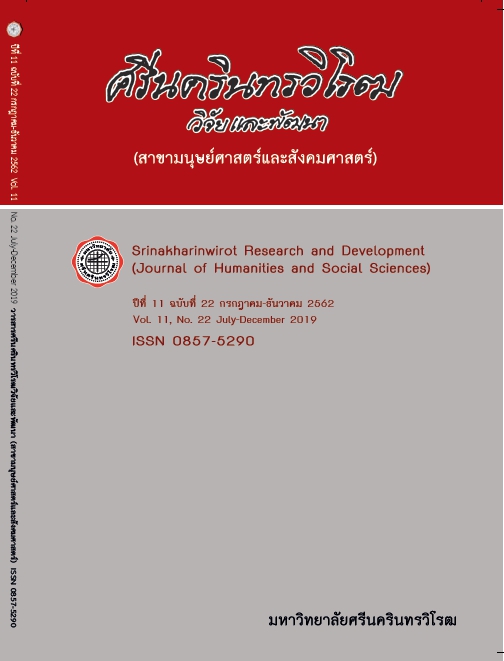การรับรู้สมรรถนะแห่งตนต่อพฤติกรรมการดูแลสุขภาพกายและสุขภาพจิตชุมชน ของอาสาสมัครสาธารณสุขประจำหมู่บ้าน (PERCIVED SELF-EFFICACY ON PSYSICAL AND MENTAL HEALTH CARE BEHAVIOR IN COMMUNITY VILLAGE HEALTH VOLUNTEERS)
Keywords:
Self-Efficacy, Physical and Mental Health Care, Village Health VolunteersAbstract
This descriptive correlation design aimed to study the relationships between self-efficacy of village health volunteers to physical and mental health care in community. The sample consisted of 86 village health volunteers who met inclusion criteria. Research instruments comprised of:
1) Personal Information Questionnaire, 2) Self-efficacy of village health volunteers to physical and mental health care in community Questionnaire and 3) Caring Behavior of village health volunteers to physical and mental health care in community Questionnaire. The reliability of the 2 nd and 3 rd instrument were reported by Cronbach's alpha as of .80 and .87. The data were analyzed by descriptive statistic and Pearson’s product moment correlation.
The results of this research were as follows:
- 1. A study showed that almost of village health volunteers had moderate self-efficacy (63.2%).
- 2. Self-efficacy of village health volunteers was significantly positively related to physical and mental health care in community (r = .79, p < .05). For subgroups of Self-efficacy, perception, confidence of physical and mental health care in community were significantly positively related to physical and mental health care in community (r = .74, p < .05 and r = .75, p < .05) and ability to utilize experience was moderate significantly related to physical and mental health care in community (r = .66, p < .05)
The result of this research suggested that health care provider realize that the self-efficacy of village health volunteers. Therefore, this study should be further developed intervention for promote self-efficacy to caring in primary care.
Downloads
References
[2] Cudjoe, T. M., Roth, D. L., Szanton, S. L., Wolff, J.L., Boyd, C.M., and Thorpe, R. J. (2018, March). The Epidemiology of Social Isolation: National Health and Aging Trends Study. Journals of Gerontology: Social Sciences. Retrieved from https://www.ncbi.nlm.nih.gov
[3] สำนักงานสถิติแห่งชาติ. (2559). การสำรวจสุขภาพจิต (ความสุข) คนไทย พ.ศ. 2558. สืบค้นจาก http://service.nso.go.th/nso/nsopublish/themes/files/mental-health
[4] ประยุทธ์ แสงสุรินทร์, อัญธิกา ชัชวาลยางกูร, ชยานันต์ ประมวลเจริญกิจ, และณัฐวดี ศรีส่ง. (2554). คู่มือ อสม. ยุคใหม่. กรุงเทพฯ: ชุมนุมสหกรณ์การเกษตรแห่งประเทศไทย.
[5] กลุ่มงานยุทธศาสตร์และข้อมูลเพื่อการพัฒนาจังหวัด. (2562). แผนพัฒนาจังหวัดนครนายก พ.ศ. 2561-2564 (ฉบับทบทวน พ.ศ. 2562). สืบค้นจาก http://www.nakhonnayok.go.th
[6] สุพัตรา ศรีวณชชากร. (2551). การพัฒนาระบบบริการปฐมภูมิ. กรุงเทพฯ: นโมพริ้นติ้ง.
[7] ฐิติมา อินทร์เนตร, อาภาพร เผ่าวัฒนา, และปาหนัน พิชยภิญโญ. (2554). การพัฒนาสมรรถนะแห่งตนร่วมกับการเรียนรู้แบบมีส่วนร่วมของอาสาสมัครสาธารณสุขในการส่งเสริมสุขภาพผู้สูงอายุที่เป็นโรคความดันโลหิตสูง. วารสารสาธารณสุขศาสตร์. 41(1), 5-16.
[8] ประยุทธ แสงสุรินทร์, และคณะ. (2554). คู่มือ อสม.ยุคใหม่. กรุงเทพฯ: ชุมนุมการเกษตรแห่งประเทศไทย.
[9] ณฐา เชียงปิ๋ว, วราภรณ์ บุญเชียง, และศิวพร อึ้งวัฒนา. (2561, มกราคม-มีนาคม). ผลของการเรียนรู้แบบมีส่วนร่วมเกี่ยวกับการป้องกันโรคหลอดเลือดสมองต่อความรู้และการรับรู้สมรรถนะแห่งตนของอาสาสมัครสาธารณสุขประจำหมู่บ้าน. พยาบาลสาร. 45(1), 87-99.
[10] Innets, T., Powwattana, A., and Pichayapinyo, P. (2011). Self-efficacy enhancement with participatory learning of health volunteer for promoting the health behavior of the elderly with hypertension. Journal of Public Health. 41(1), 5-16.
[11] Aljasem, A.I., Peyrot, M., Wissow, L., and Rubin, R.R., (2001). The Impact of Barriers and Self- Efficacy on Self-Care Behaviors in Type 2 Diabetes. The diabetes educator. 27(3), 393-404.
[12] นิธินันท์ เจริญบัณฑิตย์. (2559). ปัจจัยที่มีความสัมพันธ์กับพฤติกรรมการสร้างเสริมสุขภาพของอาสาสมัคร สาธารณสุขประจำหมู่บ้าน (อสม.). พยาบาลศาสตรมหาบัณฑิต (การพยาบาลเวชปฏิบัติชุมชน). ชลบุรี: มหาวิทยาลัยบูรพา.
[13] ประภาส อนันตา, และจรัญญู ทองเอนก. (2556). ผลของการพัฒนาศักยภาพเครือข่ายอาสาสมัคร สาธารณสุขประจำหมู่บ้านในการเยี่ยมบ้านตำบลขวาว อำาเภอเสลภูมิ จังหวัดร้อยเอ็ด ปี พ.ศ. 2555. วารสารสำนักงานป้องกันควบคุมโรคที่ 6 จังหวัดขอนแก่น. 20(1), 1-8.
[14] สม นาสอ้าน, และวิมลรัตน์ ภูผาสุข. (2553). ประสิทธิผลการพัฒนาศักยภาพอาสาสมัครสาธารณสุขประจำหมู่บ้าน จังหวัดกาฬสินธุ์. วารสารวิจัยและพัฒนาระบบสุขภาพ. 3(1), 45-61.
[15] Schwarzer, R., Antoniuk, A., and Gholami, M., (2015, February). A brief intervention changing oral self-care, self-efficacy, and self-monitoring. The British Psychological Society. 20(1), 56-67.
[16] Rice, E. (2015, July-August). Predictors of Successful Clinical Performance in Associate Degree Nursing Students. Nurse Educator. 40(4), 207-211.
[17] Giannitrapani, K.F., Soban, L., Hamilton, A. B., Rodriguez, H., Huynh, A., Stockdale, S., Yano, E. M., and Rubenstein, L. V., (2016, December). Role expansion on interprofessional primary care teams: Barriers of role self-efficacy among clinical associates. Health care. 4(4), 321-326.
[18] Bandura, A. (1977). Self-efficacy : Toward a unifying the try of behavioral change. New York.
[19] Thorndike, R. M. (1978). Correlation Procedures for Research. New York: Gardner Press Inc.
[20] อังคณา หมอนทอง. (2549). ความสัมพันธ์ระหว่างความเชื่อด้านสุขภาพ การรับรู้สมรรถนะแห่งตน ความหวังกับพฤติกรรมการดูแลตนเองด้านสุขภาพจิตของผู้ป่วยโรคซึมเศร้า. ปริญญามหาบัณฑิต (การพยาบาลสุขภาพจิตและจิตเวช). กรุงเทพฯ: จุฬาลงกรณ์มหาวิทยาลัย.
[21] Kima, K., Xueb, Q. L., Mossc, B. w., Noland, M. T., and Hana, H. R. (2018). Decisional balance and self-efficacy mediate the association among provider advice, health literacy and cervical cancer screening. European Journal of Oncology Nursing. 32, 55-62.
[22] ชนินทร์ งามแสง, ชัยธัช จันทร์สมุด, และลำพูน เสนาวัง. (2559). การจัดการส่งเสริมสุขภาพผู้สูงอายุในเขตตำบลไค้นุ่น อำเภอห้วยผึ้ง จังหวัดกาฬสินธุ์. วารสารวิจัยและพัฒนาระบบสุขภาพ. 8(3), 59-66.
[23] ทิศนา แขมมณี. (2553). ศาสตร์การสอน องค์ความรู้เพื่อการจัดกระบวนการเรียนรู้ที่มีประสิทธิภาพ. กรุงเทพฯ: จุฬาลงกรณ์มหาวิทยาลัย.
Downloads
Published
How to Cite
Issue
Section
License
Srinakharinwirot Research and Development Journal of Humanities and Social Sciences is licensed Under a Creative Commons Attribution-NonCommercial-NoDerivs 4.0 International (CC-BY-NC-ND 4.0) License, Unless Otherwise Stated. Please Read Journal Policies Page for More Information on Open Access, Copyright and Permissions.



